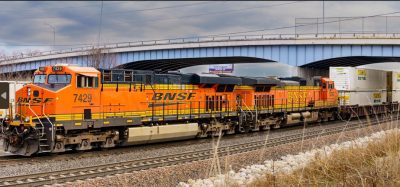COVID-19 and its impact on the European rail supply industry
Posted: 26 March 2020 | Philippe Citroën | No comments yet
Philippe Citroën, Director General of UNIFE (the Association of the European Rail Industry), writes that, despite the coronavirus crisis interrupting the regular rhythm of the European rail supply industry, this unprecedented situation could provide an opportunity to position the sector for even greater success once the pandemic subsides.


Since the middle of March 2020, Europe has been forced to adopt unprecedented measures to blunt the impact of the ongoing coronavirus outbreak. As non-essential personnel have been required to work from home, both travel and manufacturing have been restricted. This is, understandably, a difficult position for all transport sector stakeholders, including the European rail supply industry. Facing diminished production and disrupted cross-border supply chains, rail suppliers – especially small and medium enterprises (SMEs) – will require support from EU institutions during this crisis to be able to weather the unforeseen disruption and remain competitive at its conclusion.
Emergency financing
To combat the immediate economic consequences of COVID-19, the European Commission (EC) has mobilised the resources within the EU budget to help the SMEs by making €1 billion available in an EU budget guarantee to the European Investment Fund (EIF) which, in turn, will provide liquidity and guarantees to banks, mobilising €8 billion in working capital financing. This would reach at least 100,000 SMEs and small mid-caps across Europe. From a series of other measures taken at the EU level, we would like to highlight that the EC has adopted a state aid Temporary Framework. This emergency financial instrument allows Member States to set up five types of aid: direct grants, selective tax advantages and advance payments up to €800,000; state guarantees for loans taken by companies from banks; subsidised public loans to companies; safeguards for banks that channel state aid to the real economy; and short-term export credit insurance. Member States will also have greater fiscal flexibility to tackle the economic consequences of the pandemic, as they will be allowed to use a general escape clause to the very strict budgetary requirements, the so-called ‘Stability and Growth Pact’.
UNIFE believes that these steps being taken by the EC are very important in providing some degree of stability – particularly as temporary business closures due to public health precautions, shortage of workers due to quarantines, supply chain disruptions and potential order postponement all contribute to possible liquidity problems. UNIFE also welcomes that the European Investment Bank (EIB) has similarly acted by proposing mobilising up to €40 billion of financing for the impacted SMEs through various instruments. However, there must be additional actions taken to protect the transport and logistic stakeholders as they continue to provide essential services.
Coalition of transportation organisations
On 24 March 2020, UNIFE – as part of a coalition of 32 transportation organisations – endorsed a statement recommending further initiatives to be taken at the EU and national levels. First, it draws attention to the critical role the transport and logistics sectors continue to play in delivering essential products amidst a lockdown. Subsequently, the group endorses deeper cooperation at both the EU and national levels as Europe continues to try to alleviate the impacts of COVID-19 and repeats that adhering to government guidelines to prevent its continued spread is key to the sooner re-establishment of a normally functioning economy. However, the transport sector will require more than a return to normalcy in the aftermath of the coronavirus disruptions. This coalition urges policy makers to prepare for the inevitable recovery period and to begin to look at assisting the transport sector, which has been hard hit by movement restrictions. Taking the initiative now will guarantee future connectivity for European citizens and their goods, while revitalising the internal market when the crisis subsides.
A vision for European industry
Fortunately, the EU has already laid out a vision for the European industry. Shortly before the Europe-wide lockdown, the EC released its New Industrial Strategy for Europe with the intention of “maintaining the European industry’s global competitiveness and a level playing field, at home and globally”. Importantly, continuing the current Commission’s commitment to the EU Green Deal, rail was among the “sustainable and smart mobility industries” that will be given “special focus” as it works to “ensure that EU mobility industries maintain their global technological leadership”. This objective will require the implementation of the recommendations from the recently adopted “European Commission Expert Group Report on the Competitiveness of the EU Rail Supply Industry”, crafted in conjunction with other EU institutions, Member States and our sector. These key actions across 10 policy areas in three fields will strengthen the European rail supply industry while helping to lay the foundations for a more level playing field in international trade.
UNIFE also hopes to soon see a strong, finalised 2021–2027 Multiannual Financial Framework (MFF) budget that seeks to compound on these improvements by allocating substantial packages for rail projects through Horizon Europe, the anticipated extension of the Shift2Rail Joint Undertaking as ‘Shift2Rail 2’, the Connecting Europe Facility (CEF) and the Structural Funds. Avoiding delays in these schemes’ operation, and thus the implementation of the EU co-funded projects and resulting new technologies, would be more impactful if the remaining 19 EU Member States manage to fully transpose the Technical Pillar of the Fourth Railway Package by 16 June 2020. This legal transition would effectively make the European Union Agency for Railways (ERA) into the ‘One-Stop Shop’ needed to streamline vehicle authorisation processes and move us a step closer to a Single European Railway Agency (SERA).
Greater success to follow
The current crisis has interrupted the regular rhythm of the European rail supply industry. However, it also provides an opportunity to position our sector for even greater success after the coronavirus crisis calms. By protecting our workers, investing in the businesses that allow Europe to lead global rail and enacting a policy that pursues a global level playing field now, the EU can empower European rail to seize that moment.


Philippe Citroën joined UNIFE in 2011. He began his career as Transport Advisor at the French Permanent Representation to the EU, then becoming Member of the Cabinet of the French Transport Minister in 1990. In 1993, he became Manager and Chief of Staff at RATP Paris, and joined the SNCF as Strategy Director in 1999. Prior to assuming his position at UNIFE, he served for eight years as CEO of Systra – one of the world’s leading public transport engineering companies. Philippe is a graduate of Paris II University in Public Law, holds a Diploma from the Paris Institute of Political Studies (Sciences Po) and studied at the Ecole Nationale d’Administration (ENA), where he also lectured about rail and urban transport. Philippe is a member of the Global Railway Review editorial advisory board.
Related topics
Coronavirus/COVID-19, Regulation & Legislation, Safety, The Supply Chain
Related organisations
European Commission (EC), Europe’s Rail Joint Undertaking (EU-Rail), UNIFE (the European Rail Supply Industry)








